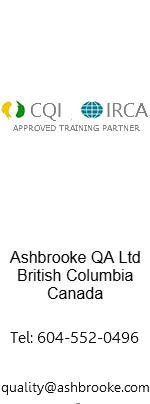Internal QMS Auditor Training Course - Overview*
(2 Days)
Focus Standard ISO 9001:2015
with 8 Workshops!
IRCA Certified, RABQSA Recognised
Objective
*This intensive 2-day course is certified by the International Register of Certificated Auditors (IRCA) Registration Governing Board and satisfies part of the formal training requirement for certification as an Internal QMS Auditor (IRCA Cert. No. 17918).
*A certificate of successful completion for passing both the IRCA QMS Foundation course (IRCA/9151) together with the QMS Internal Auditor course (IRCA/9152) will be recognized by RABQSA as equivalent to their QMS Internal Auditor course (TCD24)
On successful completion, delegates will be competent to audit their own organization:
- Be able to prepare, plan, conduct internal audits
- Be able to report the results whilst identifying efficencies and opportunities for improvement of the Quality Management Systems
Interactive learning techniques are used to maximize delegate participation, including workshops designed to broaden the knowledge of system and audit application.
Further, the delegate will be made aware of good current practices and be encouraged to develop skills trough analysis and self appraisal.
From an auditor's perspective, persons who should attend this course include:
- Personnel who audit within their own organization.
Overview
Why Audit?
It is essential for an organization to understand its performance against its requirements; and whenever possible, to identify opportunities for improvement. To achieve these objectives, an organization must set out to conduct internal reviews of itself. These are called internal audits.
Internal audits are required in ISO 9001:2015 through the clause 9.2.
The intent of this process is to ensure the organization's knowledge of itself and how it is performing to its requirements. This process is charged to the internal auditor, whether developed from within or hired from outside.
Success in the auditing process is characterized by reliance on a number of principles. These principles make the audit experience an efficient and reliable tool in support of management policies and controls, providing information on which an organization can act to improve its performance.
Prior Knowledge Expectation ...
Management systems
- The Plan, Do, Check, Act (PDCA) cycle
- The core elements of a management system and the interrelationship between top management responsibility, policy, objectives, planning, implementation, measurement, review and continuous improvement
Quality management
- The fundamental concepts and the seven quality management principles (see ISO 9000)
- The relationship between quality management and customer satisfaction
Quality management terms and definitions
- An understanding of the requirements of ISO 9001 and the commonly used quality management terms and definitions in ISO 9000, which may be gained by completing an IRCA-certified QMS Foundation training course or equivalent.
Our activities extend from Canada to Europe to Asia to Africa to Middle East.
Ashbrooke Quality Assurance Ltd. | British Columbia | Canada



